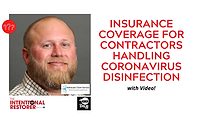The Intentional Restorer
Overcoming Legal Concerns Amid Coronavirus Cleaning | Q&A with Ed Cross
As I interact with restoration contractors, many are weighing their response to the numerous requests for help from clients against the many unknowns of addressing the coronavirus pandemic. Individuals have their personal opinions about the issue and yet, as professionals, it is our responsibility to be intentional in our response strategy so that we aren’t making things worse.
The best place to start, as the Center for Disease Control (CDC) and many others have noted, is to, “Know the facts about coronavirus disease 2019 (COVID-19) and help stop the spread of rumors.” One of the many elements of a response strategy must include a knowledge of the legal ramifications. I was in the process of discussing a lengthier background of Ed Cross for inclusion in my monthly column, The Intentional Restorer, when Ed graciously agreed to share his input for a Three Questions segment about contracts and coronavirus response.
A brief biography of Ed Cross
Interestingly enough, Ed’s law career literally started when a homeowner in the mid 90's hired him to sue a "restoration" contractor for poor workmanship on a water damage. The small job turned into a six figure settlement and was one of the first major cases litigated in the state of California that included mold related damages. Within a short period of time, Mr. Cross pivoted to representing restoration contractors. Now, for nearly 25 years, The Restoration Lawyer has been in the trenches helping contractors to do things the right way both through his legal practice as well as his extensive efforts in education.
This last year, under the leadership of Restoration Industry Association (RIA) President Elect, Mark Springer, and his industry manifesto, Our Greatest Need, Ed had been a key figure in the RIA’s focus on advocacy. Mark outlined a seven step action plan which includes the formation of an Advocacy and Government Affairs (AGA) Committee, of which Ed is the founding chair, as well as the recently appointed Restoration Contractor Advocate.
Question #1 Restoration contracts
My first question, even prior to the coronavirus outbreak and all the implications that restoration contractors should consider prior to formulating their strategic response to client needs, how is it that in 2020 contractors still are using poorly structured contracts?
What is one key thing contractors must STOP doing and one key thing they should START doing to tighten up their contracts?
You’ll have to watch the video to get it directly from Ed, but advice number one was to stop the use of traditional work authorizations. Mr. Cross states, “Performing restoration work with the traditional work authorization is kind of like playing football wearing sandals. You can do it, but it’s not going to turn out very well.” Ed recommends actul contracts for payment, like contractors would typically use, which establish an obligation by the owner to pay the contractor for the work.
Question #2 Haste makes waste
Ed participated, along with several industry professionals, in a recent RIA Town Hall panel discussion about COVID-19. Mr. Cross made a great comment that, “Haste makes waste.” Rushing into coronavirus response, even with the best of intentions, is something could open contractors to a host of potential liability exposures. The public may look at restoration contractors as opportunists with regards to clean up response. Many of our peers in the industry aren't even advertising these services and are still being flooded with calls for service.
From a legal standpoint, how can a contractor set up a team for success when considering response to coronavirus?
There are many unanswered questions related to COVID-19, so practitioners must stay abreast of the developments in this ever-changing landscape. Restoration contractors must do their homework to keep up to date with the World Health Organization (WHO), Center for Disease Control (CDC) and other relevant information outlets. Employers are responsible to make worker safety their number one priority. This work requires special training. Many experts recommend the 40-hour “hazwoper” training for this type of work. Contractors should obtain a written statement from their insurance carriers as to what, if any, coverage they have for claims arising from COVID-19. Ed’s area of speciality is not Worker’s Compensation law, so he advises contractors to consult with qualified labor lawyers and their Worker’s Compensation insurance provider. I appreciate that Ed recognizes an area where he is not the voice of authority and in so doing is an example to contractors who shouldn’t assume their own competence with regards to the unknown.
Question #3 Coronavirus contract language
When I spoke with Ed the other night, he was returning from a series of conferences and preparing for a long night at the office working on contracts for his clients. From a legal standpoint, there are numerous considerations when formulating a coronavirus response plan which include the contract language between the contractor and the client.
What are your recommendations for setting customer expectations, messaging and contract wording? What is essential for a COVID 19 response contract?
Restoration professionals need to understand how much more vast, complex and extensive the legal issues and risk exposure are with coronavirus response, as opposed to other types of work. Contractors must define a clear value proposition to answer what the customer is getting for their payment. Ed notes that this is not like mold where it is easy to verify contamination and remediation with “before and after” photographs. Contractors must research products, techniques and verification processes prior to rushing into response. Monday morning lawyers who bring lawsuits against contractors will have the benefit of hindsight when bringing potential suits against restorers. Ed shares the importance of clarifying and documenting, “What you are doing, why you are doing it, how you are doing it, when you are doing it, and where you are doing it.” As essential for all projects, contractors must set up their files to diligently tell the story of the scope of work, prior conditions and response.
The Intentional Restorer - Three Questions with Ed Cross
I am grateful for the time that Ed Cross shared with us for these Three Questions. In the closing comments of our video interview, Ed notes that contracts which include language such as “returning the site to pre-loss conditions” can be problematic for restoration contractors in addition to numerous other areas of vulnerability unique to COVID-19. Ed has released a coronavirus standardized service contract package, which is available for purchase at TheRestorationLawyer.com. Please stay tuned as we are all learning about how to respond, as citizens and professionals, to this pandemic. Control what you can control and be kind to each other.
Looking for a reprint of this article?
From high-res PDFs to custom plaques, order your copy today!






